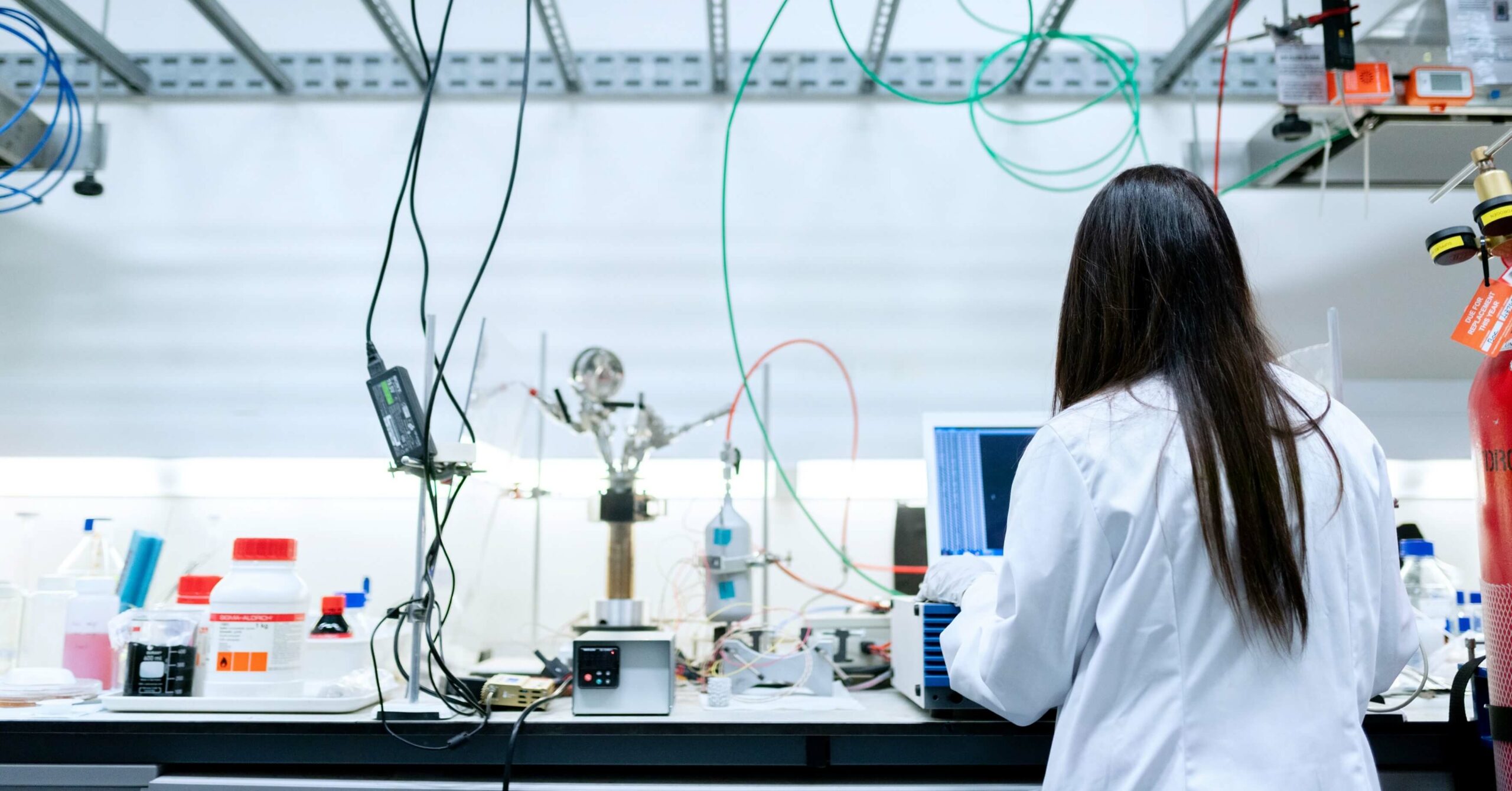Our website is not supported on this browser
The browser you are using (Internet Explorer) cannot display our content.
Please come back on a more recent browser to have the best experience possible

We have seen rapid advancements in life science research and biomedical development as of late. There is a growing demand for advancements in medical treatments and technology, which contributes to the industry’s season of change. We are seeing, for example, process improvements, digitalization, investments in new research and development, facility upgrades, etc. However, these are very costly, and they add significant pressure to resource bandwidth.
How, then, can organizations stay ahead of change and provide affordable and accessible medical products and services? The key is to lower costs and increase efficiency across the organization while scaling deliveries to get products in the hands of consumers as soon as possible. One solution stands out in this quest to enable performance across this complex industry: robust but adaptable project management.
Only organizations who excel in their project, program, and portfolio management will be able to offer the highest quality medical products and services, and they will also be able to compete in this increasingly complex and competitive sector.
Let’s explore the key challenges facing the life sciences industry: digitalization, rapid change, demand for increased production, and scaling business. Here, we will review how organizations can overcome these challenges to successfully deliver at scale.

One of the key drivers of change and an enabler of success across the life sciences industry is digitalization. This is both a challenge and an opportunity.
Moving towards digital processes provides a significant opportunity to automate and generate data that can inform decision-making, both of which can greatly improve process efficiency. On the other hand, this challenges organizations who do not already operate digitally.
Changing processes is a significant investment in time, resources, and cost. Not to mention, it requires much oversight and coordination from management that cannot be taken away from other project or operations work. Finally, there are tremendous legal requirements on top of concerns around security and data privacy as processes and services become digitized.
Nevertheless, digitization efforts are necessary. The recent pandemic and many advancements in technology have already pushed organizations to become more electronic and automated. Plus, those who can offer more digital products and leverage improved digital processes will have a competitive advantage in the industry.

Change is tough for everyone, but the constant push for change today is even more tiring. With the demand for improvements on top of already strained operations across Life Sciences, organizations are suffering from Change Burnout.
How do companies keep operations moving, focus on improvement projects, and prevent change fatigue in their employees?
Organizations require a robust change management strategy that supports business transformation with an uplifting environment. Employees need:
Second, organizations must mobilize the right resources. Resource management is a standard Project Management practice, but it is often overlooked in transformation programs and becomes an underlying culprit in delays and change fatigue. Getting people on board with change is one thing, but actually building a team to carry out the work is another. If employees are pulled in too many directions, it is difficult to move projects forward and often induces the much talked about burnout. Understanding your team’s capacity and mobilizing the right resources are crucial for business transformation.

The next step towards efficiency in this industry is reducing product time-to-market. This allows product development to meet demand because it reduces the cost of production and allows for greater output.
Let’s revisit our conversation around digitization. We mentioned that digital processes allow for automation which improves process efficiency. This also reduces product time-to-market. Yes, of course, computers and machines are faster and more reliable than people for procedural work. But what does this mean when manufacturing medicine requires quality control testing? Or for drug discovery that is research-focused?
It means finding ways to leverage digital technologies to enhance processes and increase automation as much as possible. For vaccine production, that could be implementing electronic batch records. For drug research, that could be developing a digital approval process for testing. Companies who are innovative in how they leverage technology can greatly improve their production times.
This means organizations must be flexible and responsive to change in order to incorporate new technology and processes into their existing ways of working. This requires reconsidering their project management strategy to incorporate Agile methods. Business Agility establishes the capabilities and mindset to get products and services to market faster.
Finally, incorporating new technology on a project or improving a single process is taking a step toward greater efficiency. But what about for an entire organization? Making these kinds of changes across an organization can be particularly challenging for companies in the Life Sciences industry.
They may have site locations all over the world with complex processes, and most in this sector face extensive regulations. Therefore, scaling up a product or service requires getting everyone on board and passing through the right approvals, all before rolling them out at scale.
Companies can do this through Lean Innovation. Also called Lean Process Improvement, it allows companies to identify and implement new improvement opportunities, one step at a time. Our Lean Innovation strategy is, “Think big. Start small. Adapt fast.” It’s about re-engineering processes to remove waste and focusing on what generates the most value. This allows companies to prioritize their work and optimize performance.
With this mindset, scaling up isn’t so daunting. Companies who have the Lean processes in place to adapt and grow can maximize value at any scale. Establishing lean processes can also help them to understand where to better focus their priorities.

Let’s speak to two of our experts in various sectors of the industry to find out their recommendations for success in the life sciences industry.
"There has been a lot of innovation, progress, and development in the last decade for life sciences companies, especially pharmaceuticals."
François Cram, Business Unit Manager at MIGSO-PCUBED France
“More and more companies need to transform digitally to keep up with productivity and the time-to-market challenge. However, we have found the most challenging aspect of this transformation to be the change management aspect. That is, both physically changing the actual manufacturing plants as well as managing the organizational change and ways of working.
Imagine a vaccine manufacturing plant, for example. One building is usually dedicated to manufacturing a single type of vaccine. This is due to the manufacturing impact of restrictive industrial regulation. However, as a vaccine evolves to keep up with emergent diseases, new virus strains, or new regulations, these companies need a facility that modulates quickly to stay competitive. That is directly linked to evolutive facilities (inspired from automotive industries) and Industries 4.0.
Transforming to digital manufacturing is a huge undertaking for companies. They need to update facility equipment, integrate new software into their systems, train employees, etc. They also need to do this across all their manufacturing plants and align their strategy across each location.
Such large-scale transformation requires specialized project management skills: PMO, change management, hybrid waterfall/Agile transformation services. This is where MP can help. We do all this from a project management perspective, and we are also trainers and communication leaders.
Additionally, I could see that pharmaceutical companies are very often pharma focused. It is a huge help to have an innocent “Industrial PMO professional” point of view and look at vaccine facility projects the way you could look at any other industrial project. One that looks from outside in and from end-to-end, which is something our teams are pretty good at. We have key skills in project management and change management, desperately needed by pharma companies. We then combine that expertise, along with our experience and best practices from other industries, to help them truly transform.”

"One of the biggest challenges for many pharmaceutical companies in their day-to-day is scheduling and stakeholder alignment."
Abhi Sharma, Consultant at MIGSO-PCUBED San Francisco
“There are so many phases to pass through and different paths that need aligning for each of them. There are lab tests, legal requirements, results analysis, etc. For each of these phases, it’s important for all the independent stakeholders to be aligned. There are regulatory departments, health authorities, external consultants, you get the picture. Therefore, in Bio-Tech, it’s important to have a Project Manager to align the different functionalities and have a collective high-level view of the project.
Currently, I am working in early drug discovery, where the timeline must be established all the way up through submission for FDA approval. I need to schedule and manage the tasks to achieve this and to form the teams working on the project. As drug testing occurs throughout this process, there are also multiple follow-ups required.
In this sense, my work is very traditionally project management focused; however, the challenge is the need for highly specialized pharmaceutical experience. This can also make training difficult, but that’s where MP can add a lot of value. Our consultants provide good training and project management coaching. Each company may have differing practices, but often project management techniques are translatable across any organization in pharma.
I’ve had a great experience working in this field, and I really enjoy going through the entire process of research and development. It teaches you a lot about science and about working with people. It’s also exciting to develop products that do good and really improve people’s lives.”

Despite the complexities of the life science industry, organizations can reduce cost and optimize performance. We’ve identified three key recommendations for companies to improve performance and set themselves up for success regardless of changes in the industry.
Lean Innovation, or lean process improvement, is an end-to-end solution that delivers rapid innovation by continuously re-engineering processes, products, or services to reduce waste, optimize performance, and maximize value. For the life sciences industry, Lean Innovation allows companies to develop the capacity to change and improve their processes.
Whether looking to improve their manufacturing facilities or to develop a new digital product, organizations in this industry must be able to adapt to both new technologies and to changing industry demands.
Lean innovation enables companies to reimagine their processes, eliminate waste, and deliver new technology, new changes, and new products more efficiently. It also allows them to reduce product life cycle times and shift towards an evolutive or flexible manufacturing model.
Digital transformation, process improvement, and shifting corporate strategy to stay ahead of industry changes all require PMO expertise, especially in change management, to deliver successfully. Organizations need what we call a Transformation PMO.
This is not a group of project managers hired short-term to redesign something in the company; it’s a full-scope PMO that can deliver traditional project management expertise while being change agents and anticipating risks along the way. It also includes the portfolio strategy needed to guide the organization and their funding in the right direction.
Today it is also important that the PMO be digitally focused, enabling companies to incorporate better technology, automation, and more accurate data into their processes. The life sciences will continue to evolve with the times, so it is vital that organizations have the capability to evolve with it. A Transformation PMO allows companies to do so.
Read also: The Digital PMO
Organizations cannot improve their processes without first having strong PMO Operations as their foundation. A strong and efficient PMO provides the capacity to sustain operations in the midst of innovation and change. This includes all aspects of a PMO: project/program delivery, governance and control, as well as reporting.
Project work can often feel like or become operations, especially when they are the bulk of an organization’s workload. These projects, like developing a new drug or medical product, require management time and effort just as a process improvement project would. These project operations cannot just be put on pause.
Additionally, the PMO operations who sustain project work efficiently can actually set the stage for the PMO efforts of a transformation or improvement project. One of the ways we see this is in Resource Management. Companies who understand how to mobilize and manage their resources effectively already have the foundation to support a transformation program. They understand where their task force is being utilized and how to allocate them properly for additional project work.
Life sciences have always been focused on research and discovery. Today the breakthroughs in science are pushing us forward in the medical field, being able to offer treatments we’ve never seen before. As exciting as this is, companies in the day-to-day of research and development find challenges in keeping up with change and managing their projects most efficiently. Especially focused on incorporating more and more digital technologies, companies in this sector must be innovative and adaptable. With Lean Process Improvement, a Transformation PMO, and efficient PMO operations, life science organizations will be well-equipped to successfully deliver at scale.
Interested in speaking to one of our Life Science specialists? Discover how you can leverage Project Management services to improve your performance capabilities.
We combine our expertise with a fine knowledge of the industry to deliver high-value project management services.
MIGSO-PCUBED is part of the ALTEN group.
Find us around the world
Australia – Canada – France – Germany – Italy – Mexico – The Netherlands – Portugal – Romania – South East Asia – Spain – Switzerland – United Kingdom – United States
© 2024 MIGSO-PCUBED. All rights reserved | Legal information | Privacy Policy | Cookie Settings | Intranet
Perfect jobs also result from great environments : the team, its culture and energy.
So tell us more about you : who you are, your project, your ambitions,
and let’s find your next step together.
Dear candidates, please note that you will only be contacted via email from the following domain: migso-pcubed.com. Please remain vigilant and ensure that you interact exclusively with our official websites. The MIGSO-PCUBED Team
Choose your language
Our website is not supported on this browser
The browser you are using (Internet Explorer) cannot display our content.
Please come back on a more recent browser to have the best experience possible
